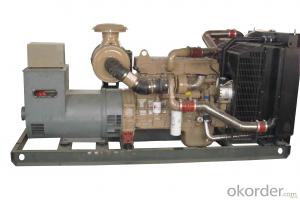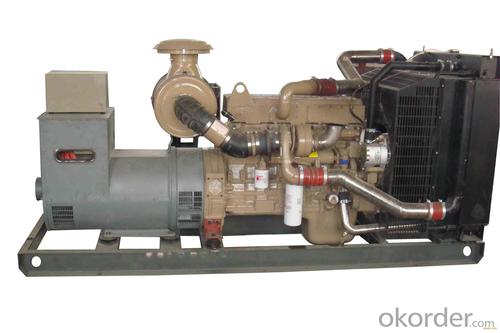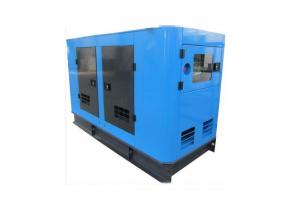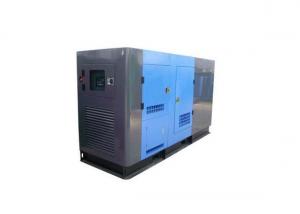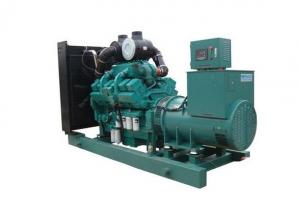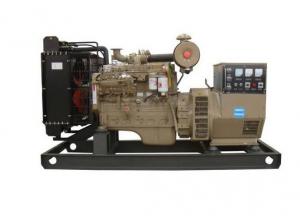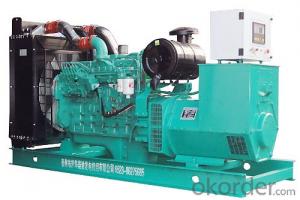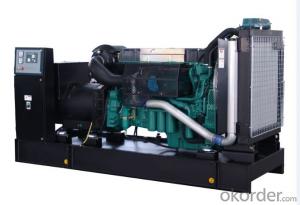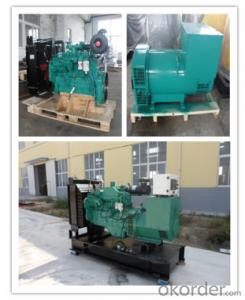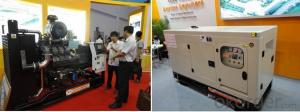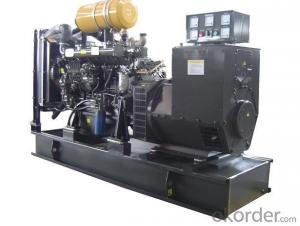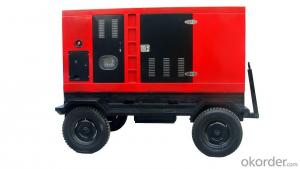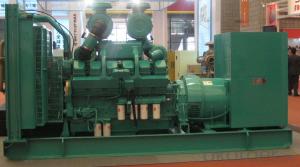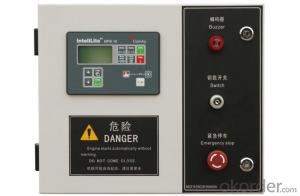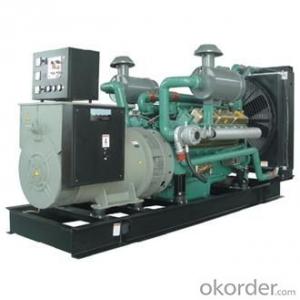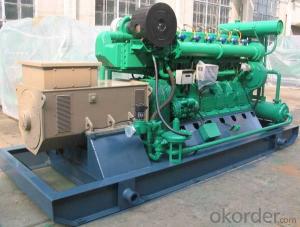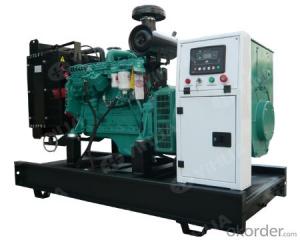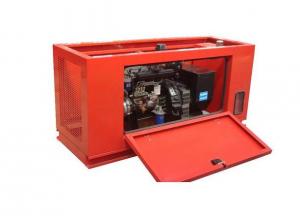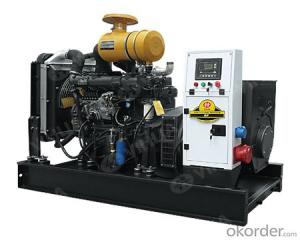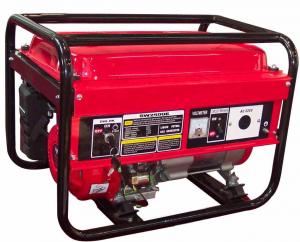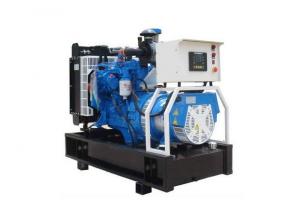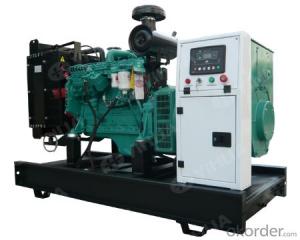Factory price china yuchai diesel generator sets 550kw
- Loading Port:
- Shanghai
- Payment Terms:
- TT OR LC
- Min Order Qty:
- 1 unit
- Supply Capability:
- 300 unit/month
OKorder Service Pledge
OKorder Financial Service
You Might Also Like
Specifications
open type dioesel generator with yuchai enginee
1) Factory direct sale
(2) CE, ISO9001 quality
Power range | 18-650KW |
Engine | All series powered by Yuchai engine |
Alternator | All series owning alternator options of Stamford/Marathon/ENGGA |
Controller system | Hanging control box, automatic control module Smartgen HGM6310 |
Base frame | International channel steel welded base, inbuilt composite damping system; sandblast, acid-washing, antiseptic treatment |
Radiator | Standard genset-joining radiator of 40 °C ambient temperature |
Diesel generator Powered by Yuchai Engine,which yuchai is a large state-owned enterprise and a Nasdaq listed company in USA (NYSE:CYD). Its main business covers diesel engine, contruction machinery, vehicle parts. The engines produced by Yuchai include series YC6G, YC4G, YC4E to which American technology applied, series YC6A, YC6B, YC6J, YC4B, YC4D, YC4F, YC4W to which German technology applied, and YC6M series in which world top technology integrated, totally 12 series.
| YUCHAI Series | Power(KW) | Power(KVA) | Jichai Engine Model | Cylinder NO. | Fuel consumption g/kw.h | DimensionL*W*H | Weight KG |
| FKS-Y550 | 550 | 200 | YC6G245L-D20 | 6 | ≤195 | 2500*970*1500 | 2300 |
- Q: I could see how it could benefit certian classes of commercial trucks,heavy equitment;ect!but what about passanger cars though?
- it can be ran on bio diesel and with electric thats one hell of a clean running car
- Q: What will be the effect of ambient temperature on diesel generators
- Fully automatic diesel generator sets are more expensive than conventional diesel engines with the same brand, configuration and power as the unit is equipped with a fully automated system.
- Q: I am buying a portable generator in order to power up to six, 500 watt halogen work lights to light up my horse arena at night. what are some things I should consider in terms of features that are needed in this application. Also, I don't want alot of bells and whistles, I need to keep as low cost as possible but still safe and quiet.
- Living on the coast and surviving hurricane Ike I did learn a thing or two about generators. The cheap ones are just that. Cheap. If you want one that will last a while go with a name you recognize like Coleman or Honda. (both great, but Honda is the king) And only buy one with just the power that you need. For some reason, a big generator- say 6000 watts will go through twice as much gas as two 3000 watt generators! No idea why. Look it up if ya want. Totally true. So you are talking about 3000 watts that you need. If all you are using is lights you wont need to worry about start-up surge. You know how they say it's a 3000 watt gen with like 3250 peak? That is because if you are running a motor like a fridge or air conditioner they will need extra oomph to get the ball rolling. Those appliances will surge higher than the amount of watts they need just to run, then they come back down. Lights don't so much do this. I know, it's confusing. Just get a good 3000 watter or just a little more in case they exaggerate a bit about the output. It happens. But probably not with a good one. P.S. I have studied long and hard to find the best way to reduce the noise. If the volume is a concern, the most effective and cheapest thing you can do is to just dig a hole 2ft deep and put the generator in it. Or in your case you could put hay bales around it, or both. OH! And you can get one that requires a gas /oil mix which is a pain in the butt, but they don't require adding oil. If you go with a gas one you must watch your oil level or risk burning up the engine. I went with gas/oil mix because if I'm using a generator I am in a crisis and might forget to check the oil.
- Q: I want to know if i can get a 40kvh generator (witch is usually ran by 4 cylinder diesel engine) to run with a water wheel and some poulies??
- (Assuming kvh is a misprint for kVA) If you can (1) get a big enough water wheel (40kVA 40 000 Newton-metres per second: you would need about 4000 kg of water per second falling through a height of 1 metre to run it at full capacity, increasing the fall or reducing the maximum load will reduce the required flow rate) and (2) ensure that you can get the generator to spin at 3000 rpm (to get 50 cycles a second) then yes.
- Q: I just purchased a KOHLER generator 500 KVA would it be safe to run at 10 % load for 6-8 hours
- 500 kva is a big generator and I am guessing it is diesel. It is safe to run at 10% load however it is not good for the engine itself to make a practice of that. It can lead to lower cylinder temperatures and incomplete combustion over time. It is always better to run at or as close to max load as you can.
- Q: I have no idea how to possibly even begin interms of comparison. i know for a standard diesel engine i can just look at fuel efficiency and overall engine efficiency, but how would i do this for a diesel electric engine??
- That is a good question! We do not want to make things to be too good, we after all live in a capitalistic society. If we wanted to make this very good we would have a 2 stroke diesel that runs on a mixture of 51% ethanol and 49% water with a caster oil lube. Then we could tune this engine to only run at a speed that is matched to the speed of a PM generator. Using this as the basis of the hybrid system. One gallon of ethanol makes almost 2 gallons of fuel. So right off the bat you would have double the fuel economy. Then another double for the hybrid system. Now you add a few PV panels to the roof so that your car will charge while you are in work. You might NEVER need to buy any fuel. But who is going to invest in a machine that does not make lots of money for somebody? After all we can not sell sunshine now can we. John.
- Q: Design the logic circuit for starting an emergency diesel generator. For the generator to start, the generator must be disconnected from the bus, there must be sufficient start air pressure, and the fuel tank must indicate there is oil. When these conditions are met, then the diesel may be started. Presume there are senors to determine these values.
- This is just an and gate function. When the outputs of all the sensors are true and a start command is present, the output of the gate will go high to allow the engine to start.
- Q: I am looking into using solar energy and generators for commercial use. Using the solar energy during the day is a piece of cake obviously. But I would need a backup generator for night-time use. If I were to get a commercial grade backup generator, could I essentially recharge it during the day while it is not in use? Any other suggestions that this route are welcome. Maybe even a backup storage (battery) for the the excess solar energy. Something to store the unused energy?
- if you are using a classical gas or diesel powered generator there would be no need for recharging obviously if you are using a bank of batteries and a inverter to convert the DC voltage to AC, then you would need to size your solar power system large enough to both run your home and charge up the batteries so enough power would be stored for night time use and seasonal adjustments.
- Q: has there been any long term tests on the effects on the engine from running it on hydrogen produced from a hydrogen generator and your ordinary gasoline/Diesel?also has anyone attempted to hook a hydrogen/H2O/Brown's gas generator up to a actual diesel generator like wisperwatt or any kind of diesel generator?any help would be great thanks!
- Long term or short term is that is doesn't work. It's a con and I can prove it. I've been posting here a long time and have posted why it won't and can't work and the HHO people have NEVER not once shown where I'm wrong, I post all my numbers shown all my math, I've even show where I get my numbers. I've even assumed that HHO works and used THEIR numbers and it still doesn't work out. Sorry but there's no free lunch. Post an edit if you want to see why it won't work using their numbers and assuming it works.
- Q: I understand it as far as the diesel engine driving the generator- or is it an alternator?- to power the motors which turn the wheels. But does each wheel have its own motor, or is it one motor per axle?
- Earlier diesel-electric locomotives used a d.c. generator and d.c. traction motors. In more recent years - since around the 1990s - a.c. alternators have been used, as suitable a.c. traction motors have been developed. Generally, modern diesel-electrics (and electric locomotives) have one traction motor per axle. I am not completely 'au fait' with US practice, but in Europe and many other countries diesel and electric locomotives are classified by wheel arrangement. Thus, a locomotive with two four-wheeled bogies (or trucks), with motors on each axle is classified as a 'Bo-Bo': i.e., 'B' signifying two axles, with the 'o' signifying that each is motored. A typical US twelve-wheeler is a 'Co-Co', and so on. Earlier locomotives - in the UK, for example - were heavier than those produced today for the same power output. They therefore had additional unpowered carrying axles, denoted by figures. For example, the early main line locomotives had a 1Co-Co1 wheel arrangement: two eight wheel trucks, the leading axle of each being unpowered, with motors on the other three. The mid range locomotives produced by Brush Traction were of the A1A-A1A arrangement, consisting of two six wheel/three axle trucks, each with motors on the end axles, and the centre axle un-powered. We even had some odd-ball five axle locomotives with a 'Co-Bo' wheel arrangement. Mechanical transmission is also used on light shunting locomotives and railcars, whilst hydraulic transmission was popular for a while in Germany and the Western Region of British Railways, but is now used for most diesel multiple-unit trains.
Send your message to us
Factory price china yuchai diesel generator sets 550kw
- Loading Port:
- Shanghai
- Payment Terms:
- TT OR LC
- Min Order Qty:
- 1 unit
- Supply Capability:
- 300 unit/month
OKorder Service Pledge
OKorder Financial Service
Similar products
Hot products
Hot Searches
